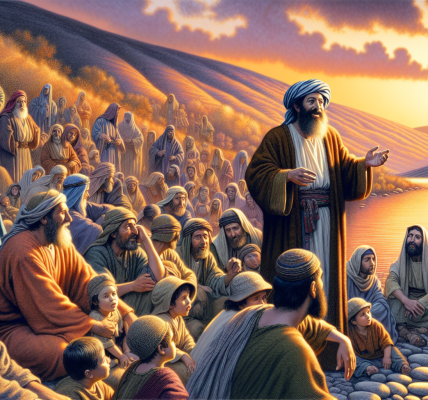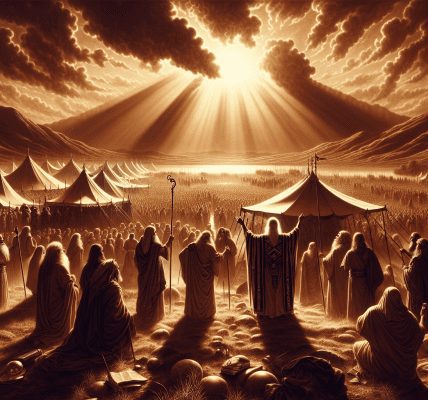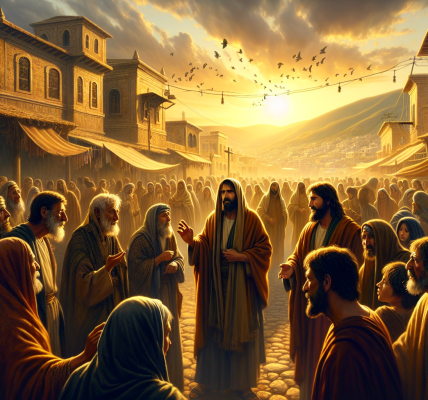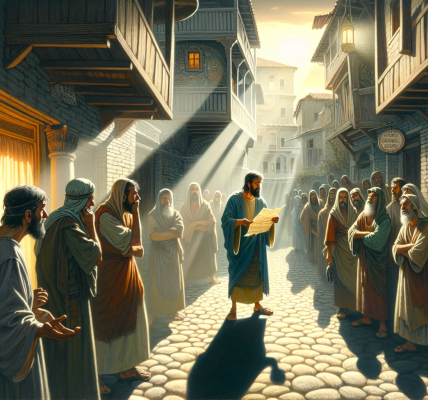**The Prophet’s Rebuke: A Story of Dishonor and Divine Love**
The sun hung low over the hills of Judah, casting long shadows across the temple courts in Jerusalem. The air was thick with the scent of burning fat and incense, mingling with the murmurs of priests and worshippers. Yet, despite the outward appearance of devotion, a deep corruption festered in the hearts of God’s people.
The Lord, who had chosen Israel as His treasured possession, looked upon their offerings with grief and anger. He had loved them with an everlasting love, yet they repaid Him with contempt. So He raised up a messenger—Malachi, whose name meant “My Messenger”—to confront the priests and the people with their unfaithfulness.
One evening, as the priests prepared the evening sacrifice, Malachi strode into the temple courtyard, his voice ringing out like a trumpet blast.
**“A son honors his father, and a servant respects his master. If I am your Father, where is My honor? If I am your Master, where is My reverence?”** His words cut through the noise, silencing the murmurs of the crowd.
The high priest, a man named Shelemiah, turned with a scowl. “Who are you to accuse us? We keep the sacrifices. We burn the incense. What more does the Lord require?”
Malachi’s eyes burned with righteous fire. **“You offer defiled food on My altar and say, ‘How have we defiled You?’ By offering blind, lame, and sick animals—would your governor accept such gifts? Would he be pleased with you?”**
A murmur of unease spread through the priests. They had grown lax, selecting the weakest of their flocks for sacrifice while keeping the best for themselves. A young Levite named Joel, who had once been zealous for the Lord, lowered his head in shame. He remembered the law: *“Whatever has a defect, you shall not offer, for it will not be acceptable on your behalf”* (Leviticus 22:20). Yet for years, they had ignored it.
Malachi continued, his voice trembling with divine authority. **“Try pleading with God for His favor while you offer such things! Would He show you mercy? No! For I am a great King, and My name is to be feared among the nations!”**
Shelemiah’s face darkened with indignation. “The Lord has blessed us despite our offerings. Why should He reject them now?”
Malachi turned to the crowd, his voice rising. **“From the rising of the sun to its setting, My name is great among the nations! In every place, incense and pure offerings are brought to Me. But you? You profane it by saying, ‘The Lord’s table is contemptible.’”**
A heavy silence fell. The people remembered the stories of their fathers—how fire had consumed the offerings of Abel, of Noah, of Elijah. But now, their sacrifices were empty rituals, devoid of love.
Then, from the back of the crowd, an old woman named Miriam stepped forward, her hands trembling. “He speaks the truth,” she whispered. “We have taken the Lord’s goodness for granted. We bring Him scraps while keeping the best for ourselves.”
Malachi’s gaze softened, but his message remained firm. **“If you will not listen, if you will not take it to heart to give glory to My name, I will send a curse upon you. I will turn your blessings into curses, for you have not honored Me.”**
That night, as the priests lay restless in their chambers, Joel could not sleep. He rose and walked to the altar, staring at the cold ashes of the evening sacrifice. He remembered the words of David: *“I will not offer to the Lord that which costs me nothing”* (2 Samuel 24:24). With tears in his eyes, he vowed to change.
The next morning, as the first light of dawn touched the temple, Joel led a flawless lamb to the altar. The priests watched in stunned silence as he placed it upon the fire—a true offering, given in love and reverence.
And though the Lord’s rebuke had been severe, His heart remained tender. For even in their faithlessness, He longed for His people to return. **“Return to Me, and I will return to you,”** Malachi would later proclaim. But for now, the choice was theirs—would they honor the God who had loved them first, or would they continue in their contempt?
The sun rose higher, its light piercing the temple courts, exposing every hidden deed. And the Lord watched, waiting for His people to remember His love.




